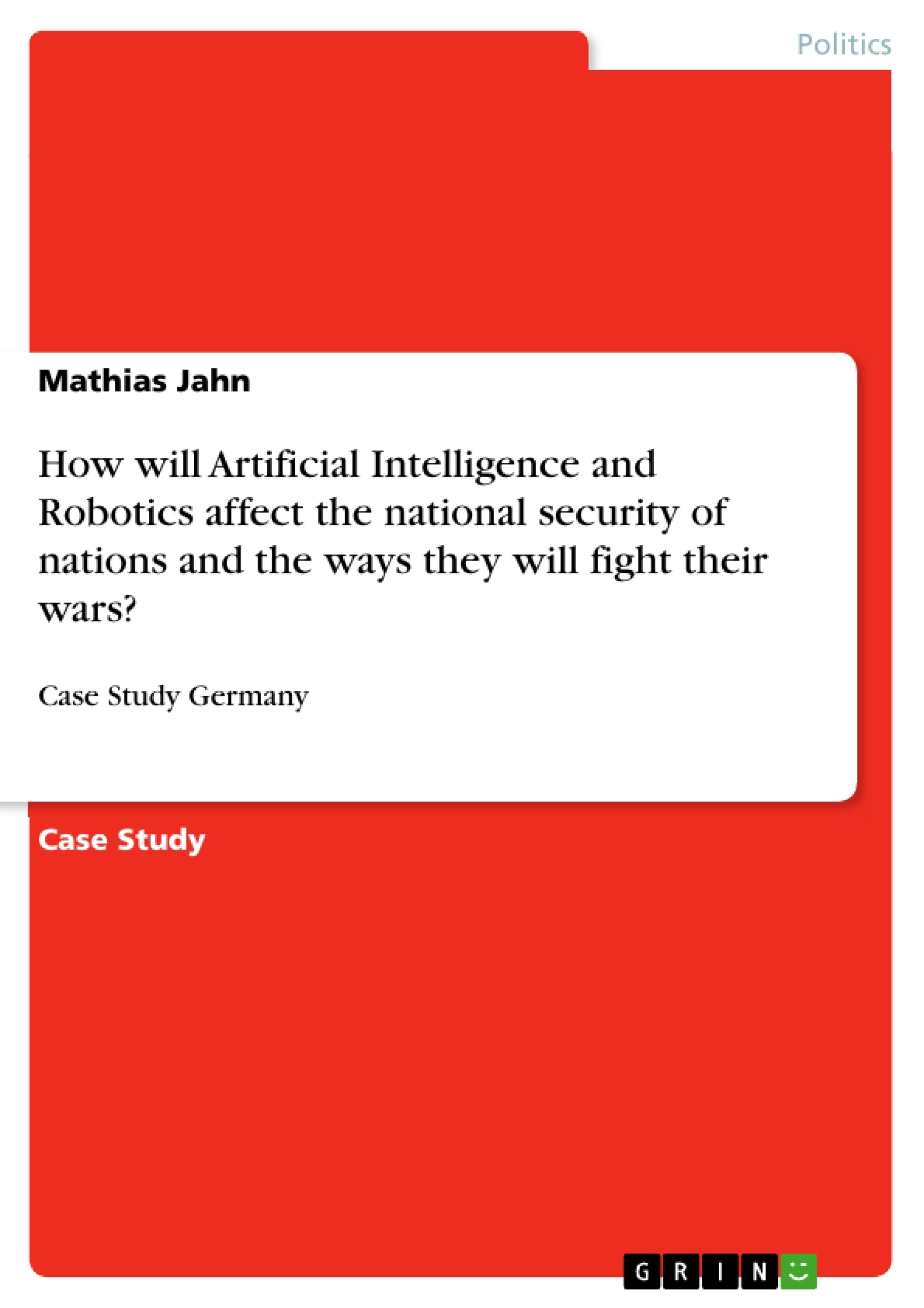Since the invention of gun powder, submarines, and airplanes, the continuous technological transformation in the realm of military capability development drives threat perceptions of nations as well as adjustments of strategies for offensive and defensive warfare. Discussed under the technical term “Revolution in Military Affairs (RMA)”, the developments in 'Robotics' continue this trend as shown by the recent supply of U.S. “Phoenix Ghost” robotic kamikaze drones to the Ukraine. In addition, the combination with 'Artificial Intelligence (AI)' would lead to “brilliant weapons systems” capable of operating beyond human control and offering the opportunity to decrease casualty rates U.S. sources suggest that the Chinese armaments industry exported these weapons in 2019 to the Middle East, which cannot rule out that the technology also fell into the hands of terrorists.
These developments set the stage for the presented case study and two research questions for Germany: How will 'AI & Robotics (AI&R)' as 'Independent Variable (IV)' affect
a) the 'National Security (NS)' on the Grand Strategy level ('Dependent Variable = DV'),
b) how wars will be fought on the Military Strategy level (DV)?
Inhaltsverzeichnis (Table of Contents)
- INTRODUCTION
- GERMANY'S NATIONAL SECURITY
- Concepts of Strategic Studies
- Germany's Grand Strategy and Military Strategy
- AI & ROBOTICS
- Definition, Characteristics, German AI Strategy
- Military Use Cases
- ASSESSMENT OF EFFECTS
- Antecedent Conditions
- Opportunities, Threats, Challenges
- CONCLUSION
Zielsetzung und Themenschwerpunkte (Objectives and Key Themes)
This paper examines the impact of Artificial Intelligence and Robotics (AI&R) on Germany's national security. It explores how AI&R, as an independent variable, influences the country's Grand Strategy and Military Strategy. The analysis focuses on the effects of AI&R on national security objectives and the conduct of future warfare.
- The evolving nature of warfare in the context of AI&R
- The impact of AI&R on national security strategies
- Opportunities and challenges presented by AI&R for Germany's defense and security
- The role of national interests in shaping Germany's response to AI&R
- The evolving military strategy of Germany in the age of AI&R
Zusammenfassung der Kapitel (Chapter Summaries)
Chapter 2: Germany's National Security: This chapter introduces key concepts from strategic studies, including national security, national interests, grand strategy, and military strategy. It then applies these concepts to Germany, discussing the country's approach to national security and its evolving grand strategy and military strategy.
Chapter 3: AI & Robotics: This chapter defines and explores the characteristics of AI&R. It highlights the German AI strategy and analyzes the potential military applications of AI&R. The chapter also examines the ethical and strategic implications of these advancements.
Chapter 4: Assessment of Effects: This chapter analyzes the effects of AI&R on Germany's national security. It considers the antecedent conditions, opportunities, threats, and challenges associated with AI&R for Germany's grand strategy and military strategy.
Schlüsselwörter (Keywords)
The main keywords and focus topics of this text include artificial intelligence, robotics, national security, grand strategy, military strategy, Germany, national interests, military force, hybrid warfare, unmanned aerial vehicles, and strategic studies.
Frequently Asked Questions
How does AI affect national security strategies?
Artificial Intelligence (AI) drives threat perceptions and requires nations like Germany to adjust their Grand Strategy to address new offensive and defensive capabilities.
What is "Revolution in Military Affairs" (RMA)?
RMA describes a major change in the nature of warfare brought about by the innovative application of new technologies, such as robotics and AI.
What are "brilliant weapons systems"?
These are advanced weapons combining AI and robotics that can potentially operate with minimal or no human control, aiming to decrease casualty rates for the user.
What is Germany's AI strategy regarding defense?
Germany's strategy involves defining ethical boundaries and military use cases while trying to maintain national security interests in a technologically evolving landscape.
What are the risks of AI & Robotics armaments?
Risks include the loss of human control over lethal force, the proliferation of technology to non-state actors (terrorists), and new forms of hybrid warfare.
- Quote paper
- Dr. phil. Mathias Jahn (Author), 2022, How will Artificial Intelligence and Robotics affect the national security of nations and the ways they will fight their wars?, Munich, GRIN Verlag, https://www.grin.com/document/1291682



